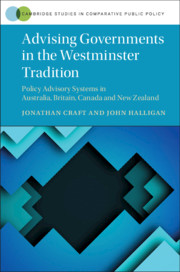 Advising Governments in the Westminster Tradition
Advising Governments in the Westminster Tradition Published online by Cambridge University Press: 18 December 2020
This chapter returns to country-level appraisals comparing the distinctive features of the four policy advisory systems (PAS) and implications for the policymaking of different advisory system configurations. The book shows that the Westminster PAS has been significantly transformed over forty years and that its elasticity has been enabled by an administrative tradition that is pragmatic and highly instrumental. Several dimensions are reappraised, providing insights into the state of the PAS. There has been remarkable change in the four PAS in terms of the supply and demand of advice. Some advisers have become more influential; others have been relegated or their influence has fluctuated because of changing ministerial needs, competition from other suppliers and the turbulence of policymaking. The work of policy advising has evolved within the public service and though the increasing professionalisation of external advisory activity. Finally, there are the implications for the quality of public policy through the directions in which PAS have changed. Questions are asked about the effectiveness of advisory systems, the impact on public policy and what learning has occurred from managing PAS. Comparative analysis helps to understand the evolving architecture of PAS and the art and craft of advising governments.
To save this book to your Kindle, first ensure no-reply@cambridge.org is added to your Approved Personal Document E-mail List under your Personal Document Settings on the Manage Your Content and Devices page of your Amazon account. Then enter the ‘name’ part of your Kindle email address below. Find out more about saving to your Kindle.
Note you can select to save to either the @free.kindle.com or @kindle.com variations. ‘@free.kindle.com’ emails are free but can only be saved to your device when it is connected to wi-fi. ‘@kindle.com’ emails can be delivered even when you are not connected to wi-fi, but note that service fees apply.
Find out more about the Kindle Personal Document Service.
To save content items to your account, please confirm that you agree to abide by our usage policies. If this is the first time you use this feature, you will be asked to authorise Cambridge Core to connect with your account. Find out more about saving content to Dropbox.
To save content items to your account, please confirm that you agree to abide by our usage policies. If this is the first time you use this feature, you will be asked to authorise Cambridge Core to connect with your account. Find out more about saving content to Google Drive.